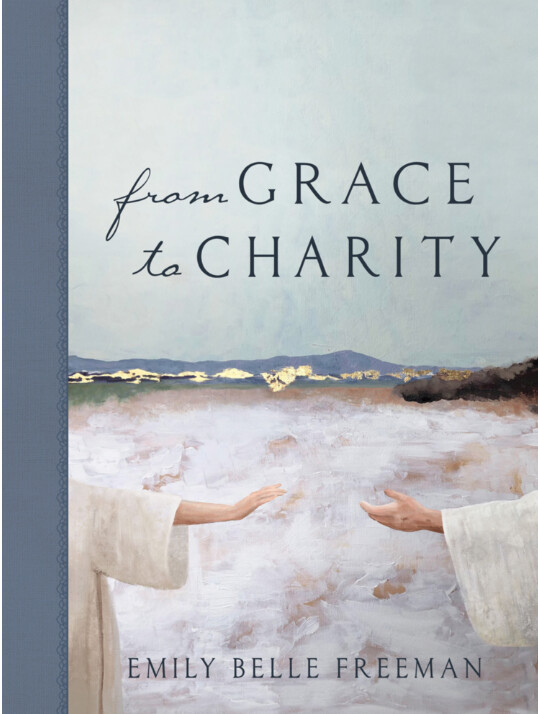[My husband] Greg had felt the prompting several times that week. After being asked to give a lesson on ministering, he felt prompted to use the parable of the talents. It is a parable that has always confused me, so I gave him several other ideas to consider. The good Samaritan, for example. Now there is a good parable on ministering.
He wouldn’t let it rest; he felt strongly about it; he really wanted to use it. “I don’t think it’s a parable about ministering,” I told him.
Finally, I gave in. Greg laid out his black leather scriptures on one end of the table; I opened up my scriptures on the other end.
“Let’s start by reading the whole thing out loud,” I told Greg. “I will try to look for anything that hints of ministering while you read.”
“For the kingdom of heaven is as a man traveling into a far country, who called his own servants, and delivered unto them his goods.” It’s a parable I have read a hundred times but never really understood. “And unto one he gave five talents, to another two, and to another one; to every man according to his several ability; and straightway took his journey. Then he that had received the five talents went and traded with the same, and made them other five talents. And likewise he that had received two, he also gained other two. But he that had received one went and digged in the earth, and hid his lord’s money” (Matthew 25:14–18).
Nothing. For the life of me, I couldn’t figure out where Greg’s prompting was coming from. Greg and I sat at two ends of the table in silence. “I really don’t think this is a parable on ministering,”
I finally said. “I don’t see anything here about love, about charity. But just for fun, let’s pretend you are the man and see what we learn.”
“You are going on a trip for a long time and our kids will take care of your goods. What do you think your goods or your work would be?” We both had the same thought at the same time. His chickens. Greg loves his chickens. He calls them his ladies, and they follow him all over the yard. He brings home special treats for them and has even been caught in the coop under the peach trees reading his Sunday talks to them. He panics over the thought of leaving his chickens for an extended period of time, so this was actually perfect!
“OK,” I told him, “you give Josh five, you give Meg two, and you give Grace one.” Those are our kids who live close to home. They know how to take care of the chickens. It makes sense he would divide the responsibility between them.
We turn back to the story to figure out what would happen to Greg’s chickens in this parable. We notice one thing is similar with the first two servants mentioned—under their watch care, the goods they were supposed to keep track of increased.
“How would that work with chickens?” I asked Greg.
Then we remembered the eggs. Under Josh’s careful watch care, his chickens would be capable of producing thirty-five eggs. Meg’s chickens would be capable of producing fifteen eggs. Both would experience an increase. When Greg returned home, they would be able to give Greg his seven chickens back plus fifty eggs. It seemed to match the parable.
Then we talked about Grace’s one chicken. Do you remember what the scripture says will happen to that chicken? Grace will bury it in the ground. I wish you could have seen Greg’s face when I explained that’s what was going to happen to Grace’s chicken. “When you return home, Grace will dig up the chicken and give it back to you.”
“It will be dead,” Greg replied in horror.
“But it will still be a chicken,” I replied. “Sadly, it won’t have produced any increase while you were gone.” In the end, it would have been better for her to have taken it to our neighbor, Tasha, who could have tended it while Greg was away. At this point in the conversation Greg decided Grace was no longer allowed to watch over the chickens when we went out of town (see Matthew 25:27).
“This parable makes a lot more sense when it’s about chickens,” I told Greg. “Now let’s put it back into the words of Jesus.”
We looked at the parable again to decipher its spiritual meaning. We decided the man traveling into the far country was the Savior. Then we wondered what His goods or His work would be.
We remembered the scripture found in Moses 1:39: “This is my work and my glory—to bring to pass the immortality and eternal life of man.” His work, His goods, are people.
His work is people.
All of a sudden it made sense why this scripture had kept coming to Greg’s mind in reference to the lesson he was preparing on ministering. Perhaps it was a parable on how to take care of the Lord’s people. We found the key that would help us better understand the parable in Ether 12:35–36: “If the Gentiles have not charity, because of our weakness … thou wilt prove them, and take away their talent, yea, even that which they have received, and give unto them who shall have more abundantly. And it came to pass that I prayed unto the Lord that he would give unto the Gentiles grace, that they might have charity.”
… Grace, that they might have charity.
Greg was right; perhaps the parable actually is a lesson on charity and ministering. It’s a parable about people. The parable reminds us that our job isn’t just to take people under our watch care, but more importantly, to help them increase. Each of us will receive assignments according to our several abilities. Some will be in a position to receive five, others two, or maybe only one. The number is not important; it’s the increase that the Lord is watching for. Perhaps the most important step in accepting a ministering assignment is to ask ourselves, How can I help this person experience an increase under my care?
▶ You may also like: ‘Who is your Ananias?’: Emily Belle Freeman on charity and second chances in the New Testament
Grace is an enabling power that will help us know what to do in order to minister to someone better—it will help us know how to participate in the Lord’s work, to bring about the Lord’s increase in each individual. His grace will also enable us to give the kind of charity required to reach every reaching. Through grace we will be empowered to embrace heartache, to mourn, to comfort and bear burdens, even to lift. It is the enabling power that will transform us to love more like the Lord. Outward grace that will allow us to minister with charity. With pure love. With His love.
In May of 1829, Joseph Knight “was very anxious to know his duty regarding this work.”1 The Lord told Father Knight, “No one can assist in this work except he shall be humble and full of love, having faith, hope, and charity, being temperate in all things, whatsoever shall be entrusted to his care” (Doctrine and Covenants 12:8).
Whatsoever shall be entrusted to his care.
If you were to walk in the red wooden door of Joseph Knight’s home in Harmony, Pennsylvania, if you were to walk down the hallway just inside that door, you would come to an old wooden chair sitting next to the white wall. Hung just above the chair you would find an old frame with a simple poem written there.
The uppercase letter at the beginning of each phrase is hand drawn with beautiful red and white scrolling. The words following are written in a soft gray font. The poem, Who Entereth Here, written by Max Ehrmann, seems to be an invitation for every visitor who enters the home. A reminder of the man who lived there, hundreds of years ago.
Who Entereth Here
Whoe’er thou art that entereth here,
Forget the struggling world
And every trembling fear.
Take from thy heart each evil thought,
And all the selfishness
For once inside this place thou’lt find
No barter, servant’s fear,
Nor master’s voice unkind.
Here all are kin of God above—
Thou, too, dear heart; and here
The rule of life is love.
Here the rule of life is love.
When Emma Smith returned to Harmony, it was with the anticipation of a new home, a new baby, a new life, and 116 pages of a new book unfolding before her eyes. It wouldn’t be long before Joseph and Emma would lose that baby, those pages, that home.
But before they were turned away from that community, in the midst of the turmoil, they were promised a fullness from the Lord, and in Father Knight they were given a friend who would stand beside them, give everything he had for the building of the kingdom, and welcome them into his home and his heart. The one whose rule of life was love. He lived that rule by being careful with all the things that had been entrusted into his care, including Joseph and Emma. It was a time of unrest, a time when many were questioning Joseph. The persecution that would follow Joseph and Emma for the rest of their lives had begun. And yet, Father Knight was a friend to Joseph in a time when Joseph and Emma were desperate for friends.
I love that he took to heart the counsel given from the Lord: “Be humble and full of love, having faith, hope, and charity, being temperate in all things, whatsoever shall be entrusted to his care.”
I want to learn from Father Knight. To be full of love. To have charity. To take care of whatsoever shall be entrusted to my care.
To remember the rule of life is love.
Notes
1. Steven C. Harper, Making Sense of the Doctrine & Covenants: A Guided Tour through Modern Revelations (Salt Lake City: Deseret Book, 2008), 54.
▶ You may also like: Emily Belle Freeman: Grace that glitters down vs. grace that lifts up
From Grace to Charity
What does grace have to do with charity? How does receiving one lead to gaining the other? Scripture tells us that charity is a love that causes us to lay down our lives for someone. A greater love. A love that we must pray to be filled with. The pure love of Christ. What if charity is the outward expression of our inward understanding of grace? It is meeting others where they are, as they are, and then lifting them. It is the way of Christ.



